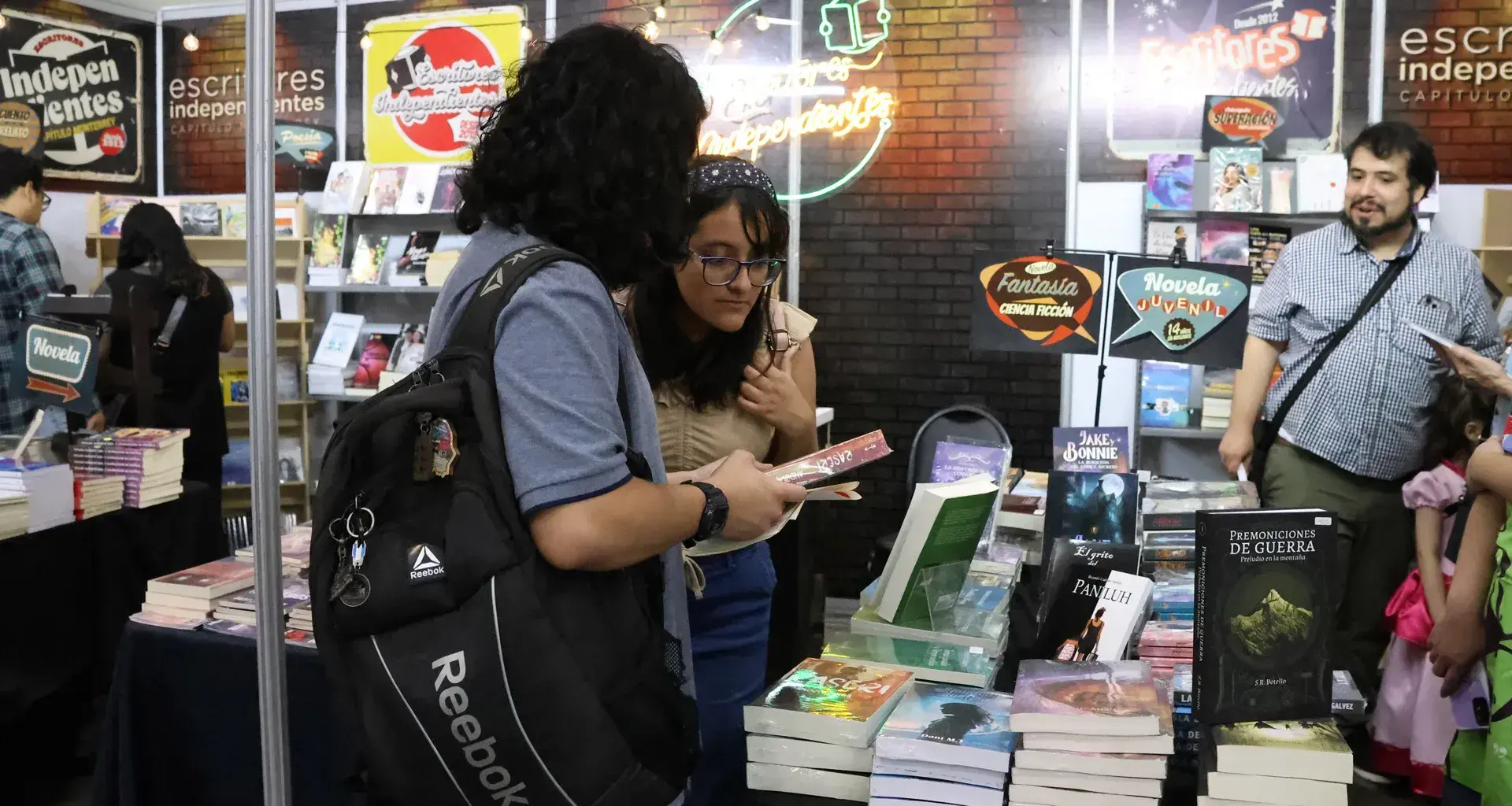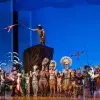The aisles of the 2024 Monterrey International Book Fair (FIL) came alive with readers of all ages visiting this cultural event in northern Mexico.
The 32nd edition of FIL Monterrey was held from September 28 to October 6 at Cintermex with different types of events such as book presentations, roundtables, workshops, book sales, and other activities.
Carmen Junco de la Vega, president of FIL Monterrey, pointed out that this literary event seeks to be a space to foster growth.
“The FIL is a platform where we project a vision of the future, a fairer, more informed, more critical and participatory society,” she said during the inauguration.
CONECTA presents a summary of the most important events of this literary festival:
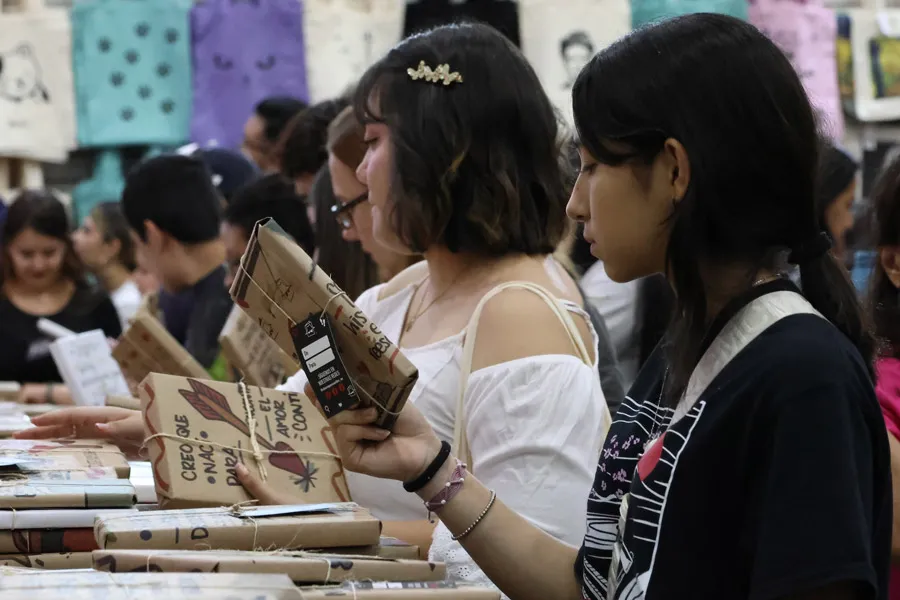
Pulitzer Prize winner present at the FIL
Author Cristina Rivera Garza, winner of the 2024 Pulitzer Prize, presented the book “Escribir con el presente: archivos, fronteras y cuerpos. Discurso de ingreso al Colegio Nacional” (Writing with the Present: Archives, Borders, and Bodies. National College entry speech) on the second day of FIL Monterrey.
The writer said that important things can be done around the common good and generosity, and that fills her with pride and joy.
“This is where a lot of my stories come from, this part of the country, from the North,” she said.
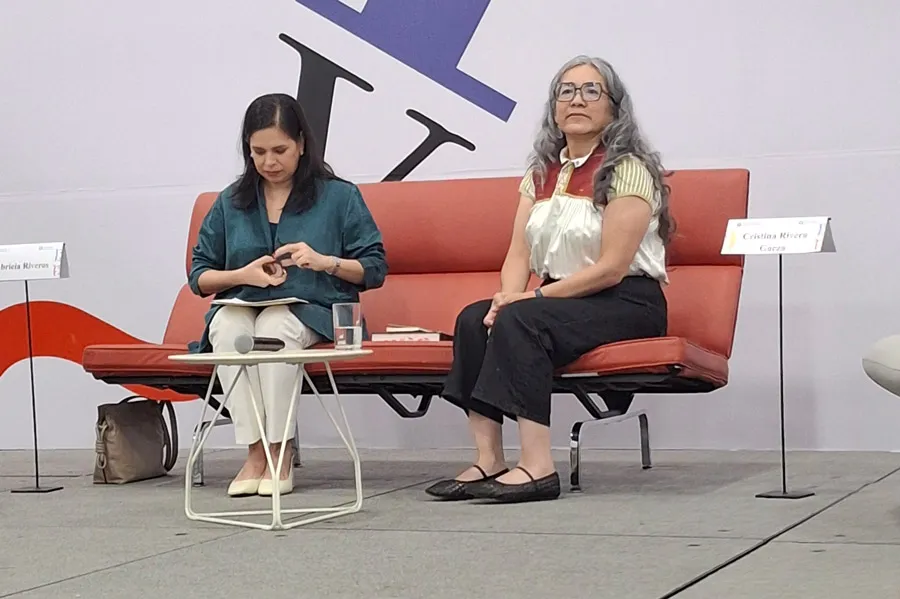
Rivera also spoke on the panel “Northern Dialogues: Community of Stories” with writer David Toscana and Dr. Roberto Domínguez of the School of Humanities and Education about the role of communities in writing.
“The language I use is full of history, and there are ties that unite us among the speakers of this language, so there is already a community starting from that,” Rivera explained.
“The truth is that when I think of community, I think of it outside the literary space since I write from an individual perspective (...) Reading gives the individual a yearning for freedom,” Toscana said in contrast.
However, the writer recognized the importance of having the reading community on the other side of the page, highlighting how a novel will always be incomplete until the reader comes to give it his or her own meaning.
The speakers ended the discussion by reflecting on the need for imagination along with a sense of duty in writing, especially when it comes to narratives that do not belong to them.
“It’s a great responsibility for me to write about the experiences and voices of those who haven’t had as much visibility,” Rivera said.
“The great challenge of writing is to write with the present, when things aren’t yet formed, and it takes courage and sensitivity to do so,” she said.
Villoro presents the book “No soy robot” (I’m Not a Robot)
“It’s a way of resisting, looking for complex thinking and searching for truth.”
This is how the writer Juan Villoro presented his book “No soy un robot” (I’m Not a Robot), during his conversation with Ana Laura Santamaría, Director of the Alfonso Reyes Chair, at FIL Monterrey 2024.
“You’re a hostage of a series of other people’s wills,” Villoro explained with respect to the use of the algorithm in today’s digital era, a topic that invites a re-definition of the concept of “alienation.”
“It’s not an alienation that at first seems dehumanizing, but on the contrary, you become a happy slave,” he explained.
However, the columnist suggested that, far from avoiding the use of technology altogether, one simply has to “deal with all the modernity, but without losing the perspective that comes from having a literary culture”.
Finally, Villoro concluded by mentioning the importance of keeping literature alive since, unlike the polarized world we live in, “the world of writing is a world of nuances,” he said.
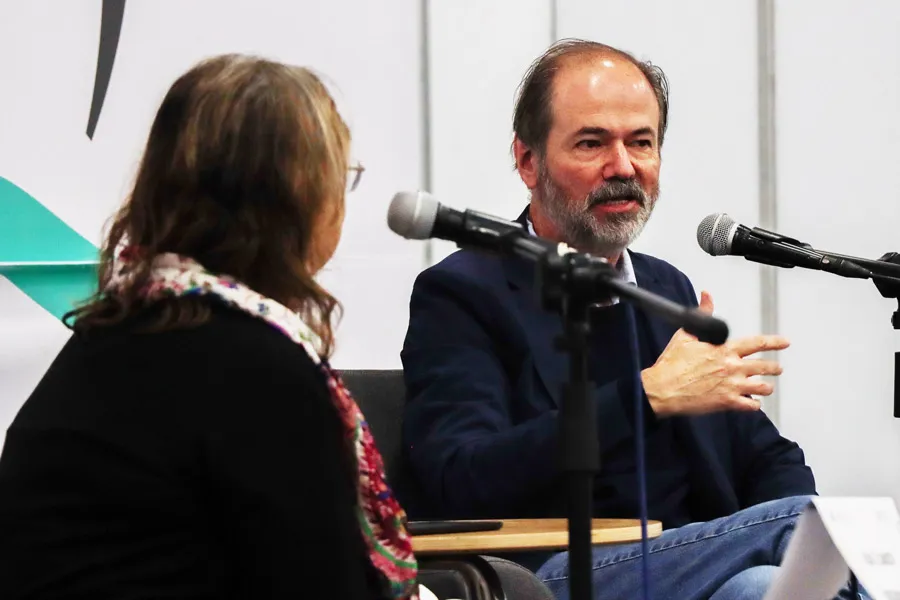
Presentation of the novel “Cuatro Veranos” (Four Summers)
Author and journalist Benito Taibo presented his novel “Cuatro Veranos” (Four Summers).
“What we write about are human passions, ours or others’, and readers will necessarily have to see themselves reflected in those human passions.”
In addition, Taibo and Juan Villoro were present at the presentation of “En agosto nos vemos” (Until August), a posthumous novel by Gabriel García Márquez.
Taibo also held a book signing.
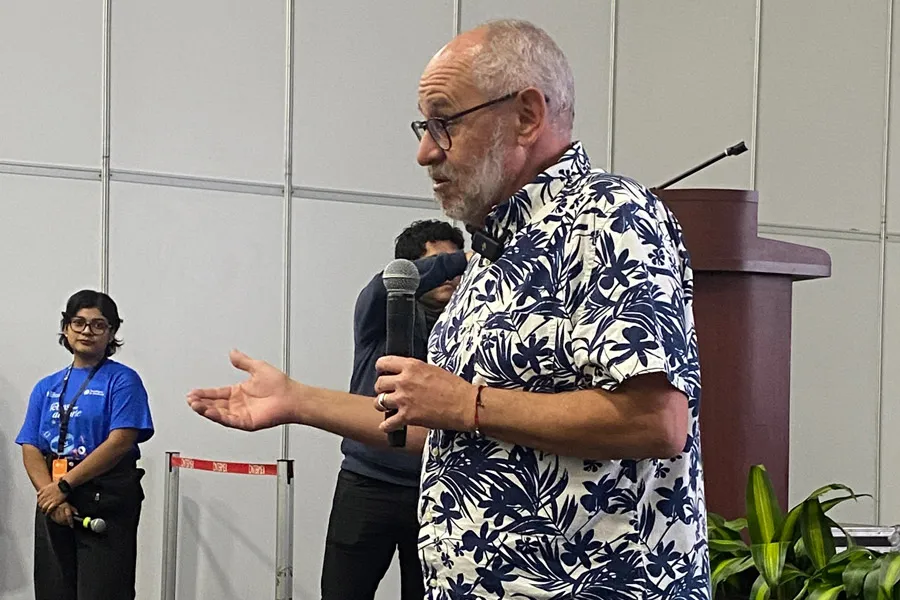
Guest of honor: UAM
The Metropolitan Autonomous University (UAM), an institution that will celebrate its 50th anniversary, was the guest of honor at this edition of the FIL.
“The recognition that FIL Monterrey and Tec de Monterrey have given to UAM, especially on this 50th anniversary, is a testament to the value of collaboration between educational institutions of all kinds.
“This openness is essential to move towards a country where knowledge, culture, and justice are the key tools to face the challenges of the future,” said José Antonio de los Reyes Heredia, General Rector of UAM.
Dr. José Antonio talked about how the new model proposes to rethink the ways of doing economics, placing the neighborhood association above individual interests and promoting fairer economic practices.
The first work, “Rethinking the Social Economy”, comes from the First UAM Forum on Social and Solidarity Economy, which brought together specialists in the field of social economy from all over the country and professors from different parts of Latin America.
Dr. José Antonio explained that “the book reflects the voices of different academics on how cooperation and justice can rethink the foundations of the economic system.”
He also stressed that the most important issue in the role of the Social and Solidarity Economy is the fight against poverty and social issues through community partnerships.
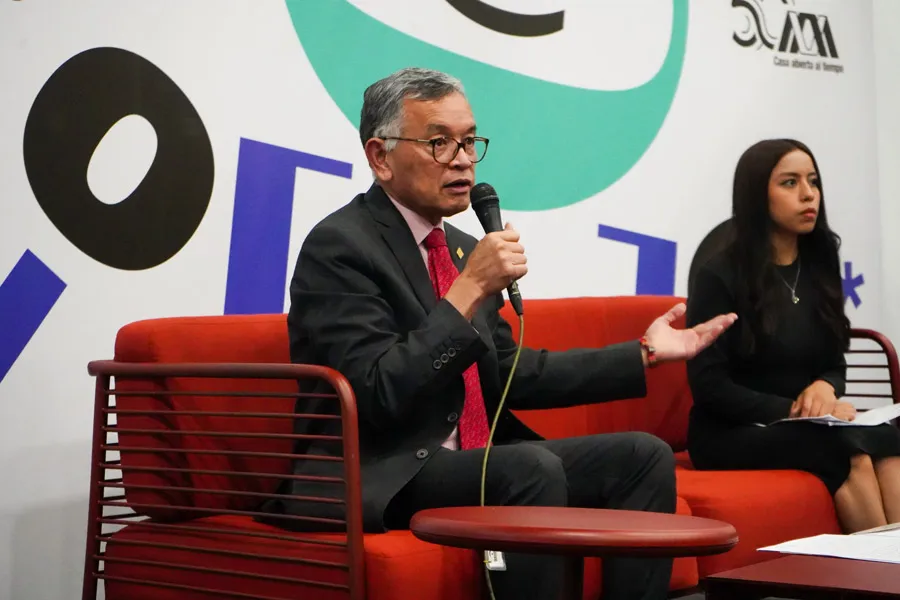
Gabriel Zaid’s new collection of books presented
Gabriel Zaid, one of Mexico’s most influential intellectuals, was honored during the Monterrey International Book Fair with the launch of a new collection of his books.
The event, organized by Pasión por la Lectura (Passion for Reading) at Tec de Monterrey, in collaboration with Letras Libres (Free Literature) and the National College, inaugurated the Gabriel Zaid Agora, a space for reflection on his vast work.
During the presentation, the first two volumes of the Gabriel Zaid Agora Library were shown: “¿Cómo leer poesía?” (How to Read Poetry) and “El progreso en bicicleta” (Progress by Bicycle), with forewords by Malva Flores and Luis de la Calle.
The series of books, aimed at young readers, addresses key themes in Zaid’s work, from poetry, cultural criticism, and economics to democracy.
This project was developed by Fernando García Ramírez, editor of Letras Libres, and writer Malva Flores, who sought to make Zaid’s ideas accessible through affordable and understandable editions for new generations.
Flores described the Monterrey-born author as a “poet of wisdom,” capable of addressing topics as diverse as politics and economics with remarkable clarity and lightness.
For his part, literary critic Christopher Domínguez pointed out that, for Zaid, “poetry is not limited to verses. Anyone can create poetry in their daily acts, whether writing an essay or making a chair.”
The event concluded with a commitment to continue publishing new volumes of the series, bringing Zaid’s ideas to future generations.
Tips for young writers
Authors Ethel Krauze and Carlos Calles discussed how young authors can venture into their own creations.
The space hosted a dialogue focused on the creative process of Krauze and Calles, along with reflections on their respective beginnings.
“It sounds like a cliché, but my writing process began through reading,” said Calles, a graduate of the Autonomous University of Chile.
“Starting to write is very easy. What is difficult is being honest with yourself,” said Krauze, who holds a PhD in Literature and is a professor at Tec de Monterrey.
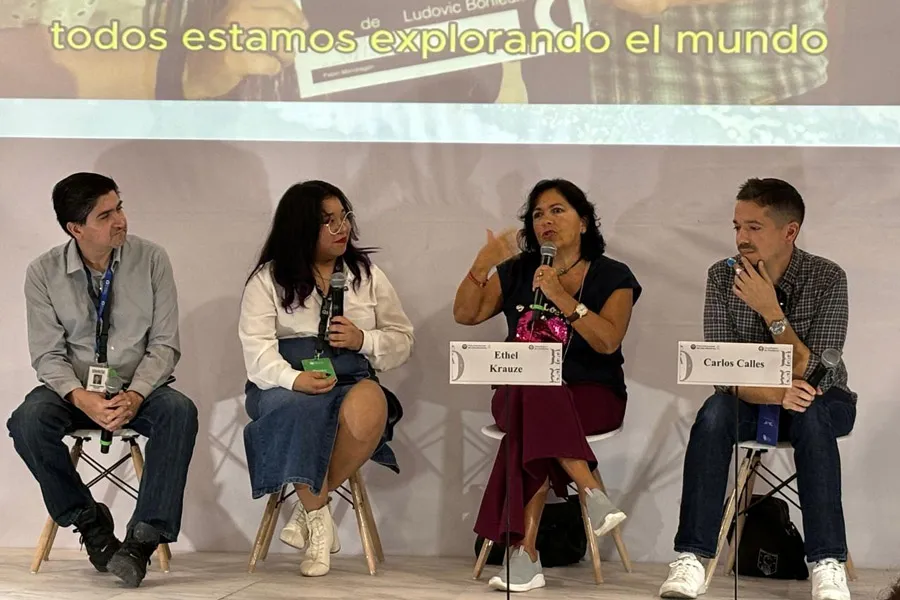
The importance of education as a key factor: Salvador Alva
Salvador Alva joined in conversation with Isela Hernández, Vice President of Human Resources at Nestlé, with the purpose of bringing together academic and business visions for the future of education.
“Education is the engine that is moving society. It’s what today determines its value,” said Alva, former President of Tec de Monterrey.
Thus, the panelists reflected on how human needs have evolved in recent decades and stressed the importance of both the education and labor sectors adapting to them.
“In the next few years, we’re going to evolve in the way we relate to work to be freer,” Hernández said.
“A great differentiator of the new generations is that they value and seek a better life balance,” she added.
Deciphering the present: the power of contemporary dystopias
Mónica Ojeda, Gabriela Damian, and Aura García delved into the analysis of dystopias in modern Latin American literature, emphasizing the role of women writers in adapting the region’s reality to fiction.
“Fiction is not at odds with political thought (...) Creating dystopian narratives helps to identify the dangers of the present,” said Ojeda.
“At the heart of every dystopia, a utopia is born, a desire for change,” Damian said.
The authors agreed that imagination is not only useful for the creation of alternative realities, but it is also fundamental to raise the possibility of a better future based on current problems.
As part of this, García pointed out how creating a social critique does not necessarily lead to fatalism, while Ojeda acknowledged that while fear can create a sense of community, it is not the only resource.
Texas librarians: digital humanities
Carolina Villarreal, Dylan Joy, and Diane López presented three projects highlighting the role of Spanish speakers in manuscripts from the U.S.-Mexico border.
Diane López, a specialist from the University of Texas, shared her musical project, which proposes a comparison and combination of traditional Texas journalism with the trend of corridos to present the Latin American experience.
The idea is to “talk about the history of our grandparents and ancestors in Texas, which from time to time goes unspoken and unmentioned,” explained López.
Dylan Joy, a Latin American archivist, joined the conversation representing the Benson Latin American Collection, whose mission is to study the presence of these groups in the United States.
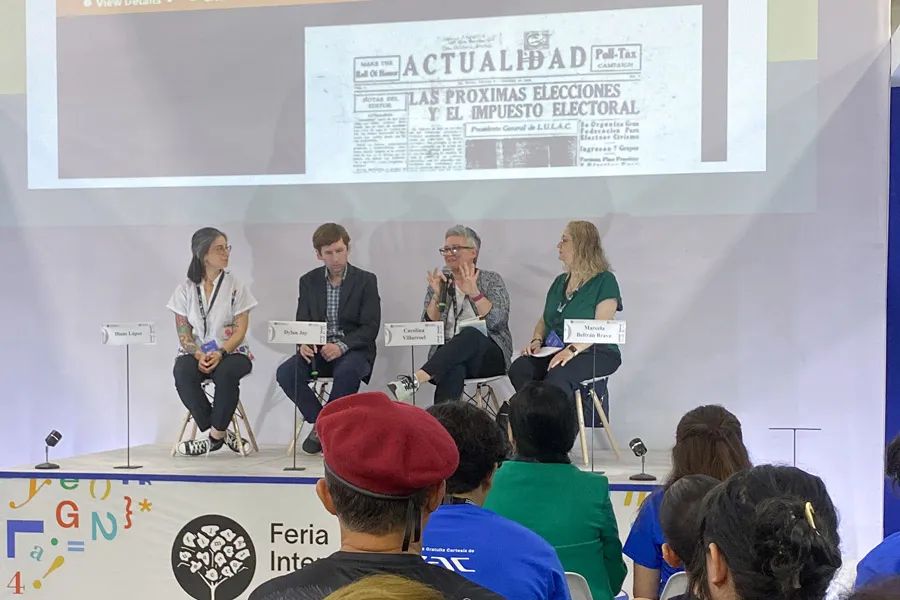
Dr. Carolina Villarreal, from the University of Houston, presented the website Periódicos de la región fronteriza entre los Estados Unidos y México (U.S.-Mexico Border Region Newspapers), whose role is to preserve the heritage of Latino newspapers in the USA.
The scholar pointed to journalism as one of the first means of communication among Latinos on the border due to their limited accessibility to books.
“The first European writing in the United States was in Spanish, not English,” explained Dr. Villareal to highlight the importance of preserving these texts.
Book “The Undying,” by Anne Boyer
According to Boyer, “The Undying” is a literary delivery that can be described as part investigative, part autobiographical, part artistic, and part critical of “being sick” and the implications of such a strong disease as cancer.
“It’s a reflection of the body’s pain and the destruction of personal life after the diagnosis,” the author explained during the presentation of her book.
“I started out thinking about creating a journalistic critique of the process of having cancer and ended up approaching it with a poet’s perspective,” she said about her book.
In addition to writing about cancer from different unique perspectives, the author also highlights breast cancer as a unique experience for the female body and one that can only be approached through the female experience.
Finally, Boyer points out how at the heart of her book lies a direct critique of the lack of economic support systems and funding for this type of disease, particularly in the U.S. healthcare system.
“Getting sick is experienced as a devastating economic mistake,” the writer pointed out.
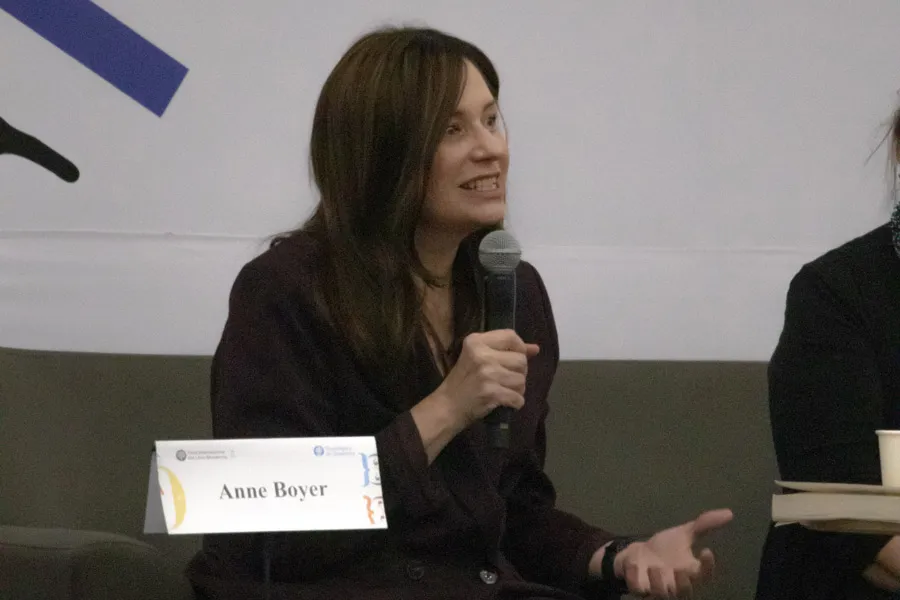
Culture and fun for children
Sensory exploration, recycling, plastic arts, and literature will be some of the workshops presented this year at the Children’s Pavilion.
Designed and promoted by the Ministry of Culture of Nuevo León, the pavilion shared the theme The Earth: Our Home, focusing its activities on caring for the planet.
This space was designed to encourage reflection, play, and imagination of children through reading.
Several state and national companies such as EFE Teatro, Los Patita de Perro, and Percha Teatro, and others performed.

Words to be tucked in with: reading in early childhood
Emilio Lome, Micaela Chirif, and Eva Janovitz spoke with Manuel Pérez and Adriana Gidi, Director and Associate Director of the Tec’s Center for Early Childhood, respectively, about the importance of introducing reading at an early age.
While the authors agreed that early childhood narratives are essential for skill development and bonding, they also pointed out that it is important to think beyond their usefulness.
“It’s the right of the youngest children to understand that reading is more than putting words together (...) Books are safety tools for children,” said Janovitz.
Both Lome and Chirif said that reading for children can go beyond written language, pointing out the value of musicalization, improvised oral stories and, above all, simplicity.
“Not everything to do with language has to be understood, and that’s OK,” Chirif said.
“Literature in the West was born in verse (...) There’s no parenting without singing. Little ones have the right to a voice in song,” Lome said, encouraging parents to put aside shame and connect with their little ones.
Passion for the written word
Jordi Sierra i Fabra was the central figure in the “Passion for the Written Word” space, where the Spaniard had the opportunity to reflect on his career from music journalism to the creation of novels.
“When I was a kid, there was no money to buy books, but I read comic books and comic strips like Captain Thunder, Flash Gordon, and Dick Kirby before I read authors like Jules Verne and Dostoevsky,” said the author of “El club de los raros” (The Oddball Club).
In addition to suffering from a stutter, Sierra’s childhood was impacted by an accident that left him immobilized and confined to a hospital bed, an event that encouraged him to write his first story and fall in love with writing.
“I realized that I didn’t stutter when I wrote (...) By the time I was eight years old, I was already checking out and reading a second-hand book a day,” said the Barcelona native.
After venturing into music journalism at the age of 22, the Spaniard abandoned his career as a rock reporter to create novels, eventually becoming recognized for his work as a “children’s” writer.
“I left music because I was born to make novels. If I don’t write, I die,” he said.
“I don’t write for young people and children, but of young people and children. I will never speak in diminutives or lower my language. Let them raise theirs,” he stressed.
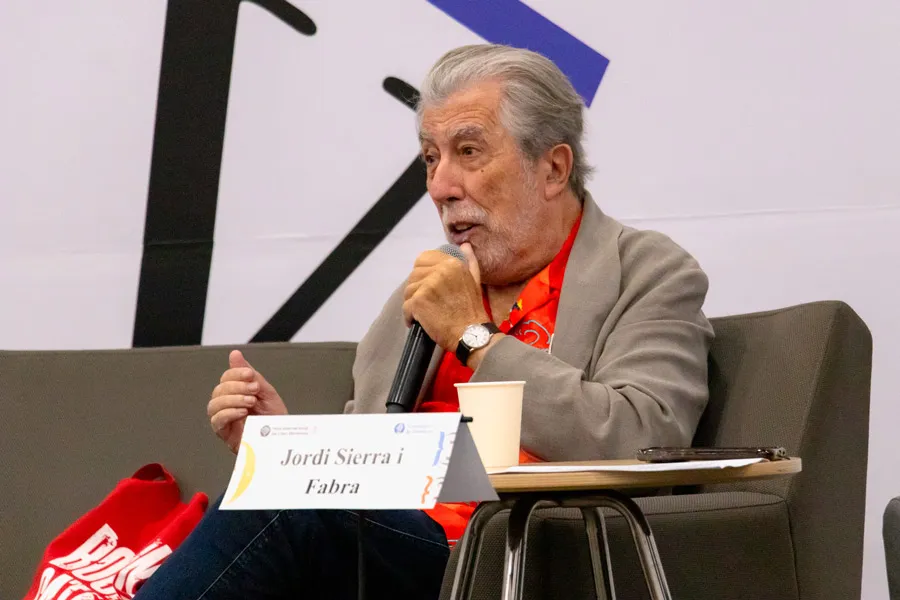
Sustainable Development Goals discussed
Juan Pablo Murra, Rector of Tec de Monterrey, moderated the discussion between the authors of the book “México a la mitad del camino de los Objetivos de Desarrollo Sostenible” (Mexico at the Halfway Mark of Sustainable Development Goals).
“This work aims to be a contribution as objective and balanced as possible for university students, professors, researchers, and students to familiarize them with the themes of Sustainable Development Goals,” said Miguel Ruiz Cabañas, first author, about the book.
José Antonio Torre, co-author, pointed out the importance of cities in the fulfillment of the SDGs themselves due to their growing populations.
“There’s a call for urgent and intelligent action on meeting these goals,” said the Director of Tec’s Center for the Future of Cities.
For her part, Maria Julia Martinez, Director of the SDG Center, pointed out the importance of the collaboration of companies, government, and institutions to achieve change.
“It’s essential to promote alliances of those in favor of sustainable development and to listen to all voices,” she said.
To complement the conversation, Luis Fernández Carril highlighted the environmental issue, stating that according to the IPCC, 85% of the population is already suffering the effects of climate change.
The opinions of experts lead to one truth. We are halfway through this perpetual struggle with time, in which the only answer is to work together to transcend together.
The opening of FIL 2024
Saturday, September 28 was the first day of FIL 2024.
The ribbon cutting ceremony was attended by David Garza Salazar, Rector and President of Tec de Monterrey; and Samuel García, Governor of Nuevo León; Juan Pablo Murra, Rector for Higher Education at Tec de Monterrey; and other authorities.
READ MORE:

